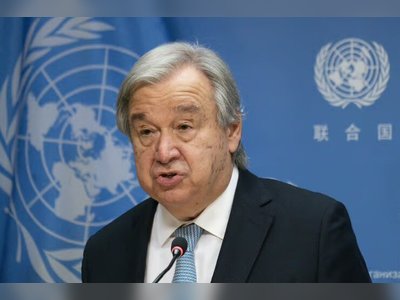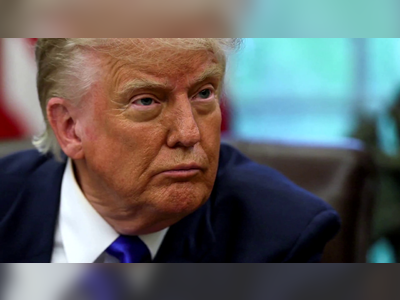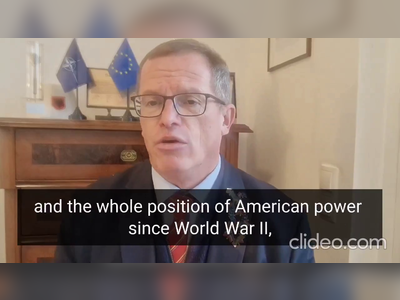Austrian Chancellor Steps Down After Coalition Negotiations Fail
Following the collapse of talks between centrist parties, Chancellor Karl Nehammer resigns, casting uncertainty over Austria’s political future.
Austria is facing a deepening political crisis after conservative Chancellor Karl Nehammer announced his resignation on Saturday following unsuccessful coalition discussions with the Social Democrats (SPO).
This impasse leaves the nation without a clear strategy to establish a stable government three months after parliamentary elections.
Failed Coalition Negotiations
The unsuccessful talks highlight the increasing challenges in European politics, with centrist parties struggling to counter the rise of the far-right.
The far-right Freedom Party (FPO), led by Herbert Kickl, became the largest party in Austria’s September elections with 29 percent of the vote but lacks a majority to govern independently.
Nehammer had dismissed the possibility of a coalition with the FPO, labeling Kickl as too divisive and a supporter of conspiracy theories.
Negotiations with the SPO reached a deadlock, with each party blaming the other.
SPO leader Andreas Babler criticized Nehammer’s People’s Party (OVP) for suggesting cuts to pensions and public sector salaries, while Nehammer accused the SPO of inflexibly demanding taxes on wealth and inheritance.
The liberal Neos had withdrawn from the talks a day earlier, citing a lack of ambitious reforms from either side.
Leadership Transition
In a video posted on X, formerly known as Twitter, Nehammer confirmed his impending departure as chancellor and leader of the OVP, promising an 'orderly transition.' The OVP leadership is scheduled to meet on Sunday to select his successor, with speculation that the new leader may take a more conciliatory stance towards the FPO.
Rising Influence of the Far-Right
The FPO has seen its popularity rise since the last election, maintaining a significant lead over both the OVP and SPO in recent opinion polls.
This increase complicates the political situation for Austrian President Alexander Van der Bellen, who now faces the decision to either task Kickl with forming a government or call for early elections.
Van der Bellen, formerly a leader of the Greens, has expressed concerns about Kickl becoming chancellor but is faced with limited options due to ongoing political deadlock.
The far-right FPO had previously governed in coalition with the OVP from 2017 to 2019, a partnership that ended after a scandal involving then-FPO leader Heinz-Christian Strache.
Despite this past, sections of the OVP seem increasingly open to renewing ties with the FPO, reflecting shifting political dynamics in Austria.
Wider Implications
Nehammer’s resignation and the breakdown of coalition talks underscore broader tensions in European politics, with mainstream parties struggling to contain the far-right’s increasing appeal.
The situation is similar to recent events in Germany, where a three-party coalition also faced difficulties in maintaining unity, highlighting the challenges of forming cohesive governments in polarized environments.
Kickl, in a statement on Saturday, criticized the coalition talks and accused President Van der Bellen of intentionally marginalizing the FPO.
He blamed the president for the present political 'chaos' and renewed his calls to be given the mandate to form a government.
As Austria navigates this uncertain period, the outcome will impact its democratic institutions and the broader European political landscape.
Whether through a new coalition or an early election, the path forward is likely to test the resilience of Austria’s political system.
This impasse leaves the nation without a clear strategy to establish a stable government three months after parliamentary elections.
Failed Coalition Negotiations
The unsuccessful talks highlight the increasing challenges in European politics, with centrist parties struggling to counter the rise of the far-right.
The far-right Freedom Party (FPO), led by Herbert Kickl, became the largest party in Austria’s September elections with 29 percent of the vote but lacks a majority to govern independently.
Nehammer had dismissed the possibility of a coalition with the FPO, labeling Kickl as too divisive and a supporter of conspiracy theories.
Negotiations with the SPO reached a deadlock, with each party blaming the other.
SPO leader Andreas Babler criticized Nehammer’s People’s Party (OVP) for suggesting cuts to pensions and public sector salaries, while Nehammer accused the SPO of inflexibly demanding taxes on wealth and inheritance.
The liberal Neos had withdrawn from the talks a day earlier, citing a lack of ambitious reforms from either side.
Leadership Transition
In a video posted on X, formerly known as Twitter, Nehammer confirmed his impending departure as chancellor and leader of the OVP, promising an 'orderly transition.' The OVP leadership is scheduled to meet on Sunday to select his successor, with speculation that the new leader may take a more conciliatory stance towards the FPO.
Rising Influence of the Far-Right
The FPO has seen its popularity rise since the last election, maintaining a significant lead over both the OVP and SPO in recent opinion polls.
This increase complicates the political situation for Austrian President Alexander Van der Bellen, who now faces the decision to either task Kickl with forming a government or call for early elections.
Van der Bellen, formerly a leader of the Greens, has expressed concerns about Kickl becoming chancellor but is faced with limited options due to ongoing political deadlock.
The far-right FPO had previously governed in coalition with the OVP from 2017 to 2019, a partnership that ended after a scandal involving then-FPO leader Heinz-Christian Strache.
Despite this past, sections of the OVP seem increasingly open to renewing ties with the FPO, reflecting shifting political dynamics in Austria.
Wider Implications
Nehammer’s resignation and the breakdown of coalition talks underscore broader tensions in European politics, with mainstream parties struggling to contain the far-right’s increasing appeal.
The situation is similar to recent events in Germany, where a three-party coalition also faced difficulties in maintaining unity, highlighting the challenges of forming cohesive governments in polarized environments.
Kickl, in a statement on Saturday, criticized the coalition talks and accused President Van der Bellen of intentionally marginalizing the FPO.
He blamed the president for the present political 'chaos' and renewed his calls to be given the mandate to form a government.
As Austria navigates this uncertain period, the outcome will impact its democratic institutions and the broader European political landscape.
Whether through a new coalition or an early election, the path forward is likely to test the resilience of Austria’s political system.
AI Disclaimer: An advanced artificial intelligence (AI) system generated the content of this page on its own. This innovative technology conducts extensive research from a variety of reliable sources, performs rigorous fact-checking and verification, cleans up and balances biased or manipulated content, and presents a minimal factual summary that is just enough yet essential for you to function as an informed and educated citizen. Please keep in mind, however, that this system is an evolving technology, and as a result, the article may contain accidental inaccuracies or errors. We urge you to help us improve our site by reporting any inaccuracies you find using the "Contact Us" link at the bottom of this page. Your helpful feedback helps us improve our system and deliver more precise content. When you find an article of interest here, please look for the full and extensive coverage of this topic in traditional news sources, as they are written by professional journalists that we try to support, not replace. We appreciate your understanding and assistance.














